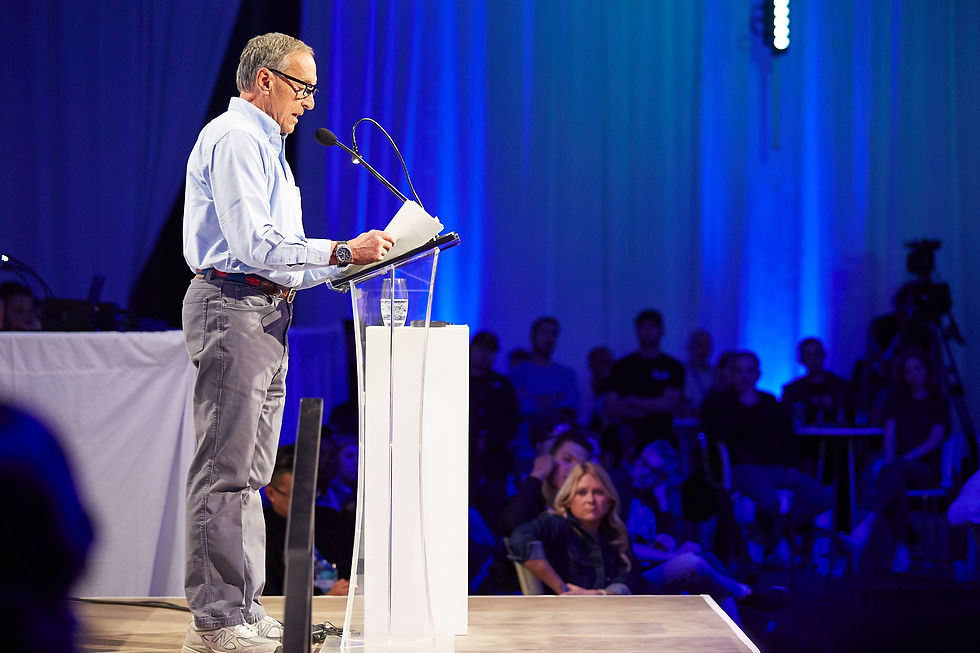Five Things Corporate Clients Should Expect From Their Professional Event Photographer
- Jeff Pinette

- Dec 7, 2020
- 4 min read
Great photos of you delivering speeches announcing milestones are an excellent addition to your organization’s media kit, a chronicle of successful progress and crucial for generating publicity in any company new or old. Therefore, it’s important to have high but realistic expectations of an in-house or professional photographer. I've only stood in front of an audience a few times but I recognize the the task at hand for the person(s) behind the podium— as a professional event photographer there are things each should know about the other’s role. Here are five practices on how photographers work, because the more you know the easier it will be to give and get your best shot.

Here are five things A professional event photographer will do:
1. A Professional will generally only take pictures during the first few minutes and natural transitions during your speech or presentation. A good photographer will let you start your speech for a moment before he or she starts shooting and or be very conspicuous. This allows you to get comfortable at the lectern and establish rapport with your audience. Then the photographer will take pictures from various angles while trying not to draw attention to themself. Then, after a few minutes, they'll stop. A good photographer doesn’t need to shoot pictures throughout the entire speech. It’s distracting. After the event, most people won’t even remember there was a photographer during the presentation when all is executed by a professional.
2. NO flash. In most situations with proper conditions refrain from using a flash. There is generally no reason for a pro photographer with the correct equipment to set off fireworks during speeches and presentations. In most cases, a flash turns the heads of the audience so they can find out where the strobe is coming from. It’s reasonable for you or your press agent to let the photographer know beforehand that you wish them to shoot without flash. If you know nothing about photography, you can sound knowledgeable by saying, “Please turn up your I-S-O so you don’t have to use flash.” As a corporate event planner you can help your photographer create better images by planning to have the podium illuminates with one or two directional lights.
3. Deliver the best shots. Amateurs take lots of photos and show them all. A professional takes tons of photos and only shows a few. You’re hiring the photographer not for every shot taken but for the final select edited images. Please don’t ask to see the photos on her camera during the event most of them contain closed eyes, weird expressions and unflattering moments that may have seemed perfect on the fly. Due to the spontaneous nature of corporate events, numerous people and faces in the frame at once any photographer is going to find numerous unusable candid images due to closed eyes, unflattering facial expressions or someone drinking coffee that doesn't make the cut.
4. Capture you at your best. Most of us look a bit funny when a viewer hits the pause button during a video of our speech. It’s the same for many still photos of speeches. Our mouth is skewed or our eyes might be closed while blinking. But a good photographer will take many photos of your speech during those first few moments and deliver the best finals. Your mouth will be open without your tongue flailing, the microphone won’t look like it’s coming out of your nose, and there won’t be a flagpole or light tree sticking out of your head. You will look good, polished, professional, in-charge and “executive.”
5. Understanding cost and the value added. Depending on your region, and the photographer’s level of skill and experience, you should expect to pay an event photographer at least $150-$250 per hour, and normally with minimum hours, travel and special equipment fees. Professional Photography equipment isn’t cheap. My professional portable kit that l bring to every event contains at least $15-20k of equipment inside my rolling bag and that's not including the $3000 laptop, expensive software, terabytes of pricey drive space and Insurance (btw any pro will carry insurance). it’s important to recognize what your paying for when you hire a professional event photographer: time shooting, knowing how to shoot, back up procedures, mobile image delivery methods time editing, time traveling, use and abuse of camera equipment, efficient use of photo editing software. Most importantly, the photographer’s experience and confidence navigating your event. Oh sure, this is an age in which everyone has a decent camera on their phone, i've actually taken a few amazing images during events on phones. but for high-profile demanding events would you risk just handing your phone to your administrative assistant before your speech? You need someone who is worthy of a high-end camera and lenses—someone with a trained eye and experience anticipating the important moments . That is ultimately why you and your PR agency will invest in a professional—so you can capture the best version of your organization.
Now that you have put a lot of planing into your upcoming company meeting or big event, do what it takes to have your corporate event photographed and those attending looking thier best. It’s an investment in you and your company successful image, and that’s worth it.




























Comments